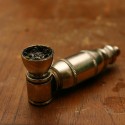Alcohol consumption doubles since the 1960s
Britain is facing a “silent epidemic” of dementia as alcohol consumption has doubled since the 1960s, doctors have warned.
The link between alcohol consumption and dementia is being ignored and unless urgent action is taken today’s binge drinkers will be tomorrow’s dementia patients, psychiatrists said.
Public awareness campaigns and labels warning that dementia is linked to alcohol should be introduced, they said.
The National Audit Office has found that 10m people are drinking at levels that are hazardous or harmful to their health in England by regularly consuming over the recommended limits.
Last week the respected Government Foresight group predicted the number of people with dementia will double to reach 1.4m over the next 30 years while costs will treble to hit £50bn a year.
This prediction was based largely because of the ageing population and increasing alcohol consumption.
Is affect on dementia rates were not included.
Writing in the British Journal of Psychiatry, two dementia experts have analysed Britain’s growing consumption of alcohol and the possible consequences on the brain.
Dr Susham Gupta, a specialist registrar in adult and old age psychiatry, and Dr James Warner, a consultant in older adults’ psychiatry, said the relative price of alcohol has halved in real terms since the 1960s.
At the same time average annual consumption of alcohol per person has doubled from less than six litres to more than 11.5 litres in 2000.
The authors wrote: “This is still increasing in all age groups.
“Alcohol misuse in the elderly is also underestimated and under-diagnosed.
“If the present trend of alcohol consumption continues, within a decade the UK will rise from the middle range to the top among European countries.”
The current estimates of 700,000 people with dementia is based on people whose drinking was half the current level of today’s young and middle aged people, they added.
“Given the neurotoxic effects of alcohol and the inexorable increase in per capita consumption, future generations may see a disproportionate increase in alcohol-related dementia.”
But they warned that public awareness campaigns are likely to be unpopular and ineffective especially because of the long time lag between excessive drinking and the development of neurological symptoms.
“This might need similar legislation to that used in the fight against tobacco-related health problems,” they said.
“This is an under-recognised problem and urgent action is needed to prevent a new epidemic.”
Prof Ian Gilmore, president of the Royal College of Physicians and chairman of the Alcohol Health Alliance, said while labels warning that “alcohol will rot your brain” would be a very powerful message, more research would be needed first.
In the meantime raising the price and restricting sales was proven to be the most effective methods of reducing consumption of alcohol.
“It is very difficult to get young people to take longer term risks into account, and that was shown with smoking too,” Prof Gilmore said.
He said the paper did not raise the issue that alcohol affects the development of the brain which continues well into the 20s.
Dr Susanne Sorensen, Head of Research at the Alzheimer’s Society said: “Binge drinkers hitting the town on a Saturday night are becoming a familiar sight, but we don’t yet understand how it will affect the numbers of people with dementia.
“As drinking habits change, it is vital we understand more about the relationship between alcohol and this devastating condition.
“Previous research has focused on alcohol dependent people, who are at an increased risk of dementia because they become malnourished for long periods of time.”
Dr Sorensen added: ” In contrast, binge drinkers drink heavily at certain times but may still eat well and therefore do not have the same type of risk.”
“One in three people over 65 will die with dementia. We desperately need new research into the long-term effects of all types of alcohol consumption – from people who drink more than a few glasses of wine each night to binge drinkers.”
Government recommendations say women should drink no more than two to three units a day and men no more than three or four units.
A small 125ml glass of 12% ABV wine is the equivalent of 1.5 units and a pint of 5% ABV beer is 2.8 units.
To calculate the number of units in a drink, multiply the alcohol by volume figure with the volume in millilitres and then divide by 1,000.
____________
source: Telegraph

